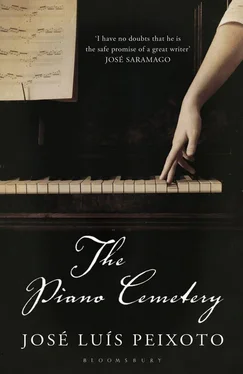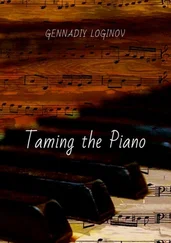‘Now we know who’s going to die first.’
There were Sundays. Looking back, it’s impossible to avoid the feeling that a lot of them were wasted. Today I feel that just one more Sunday would be enough for me to be able to resolve everything. Then straight after that, I think that it would not. Then straight after that, I think that yes, it would. A single Sunday, from the morning, always bright and unconcerned, a whole day to take advantage of, to waste until the drawing-in of the night — an illusion created by a planet that turns around itself. Today is a Sunday different from every other — Francisco is running the marathon in the Olympic Games. It is this shock of happiness that wakes first Íris, then all the other children, then Maria, Marta, then my wife, who, waking, almost believes she never fell asleep. It is Sunday, Sunday, Sunday, Sunday, Sunday.
Marta combs Hermes’s hair in front of the bathroom mirror. Maria gets excited walking up and down the hall runner, followed by Íris, who wants to tell her something, or who just wants to pretend for a few moments that she is big and has important chores to do. Ana and Elisa are talking in the living room. Ana’s eyes are shining with the illusion of being a big girl, correct, well-behaved, who does what is expected of her, who understands conversations. My wife is in the kitchen — piano music on the wireless — and she is thinking.
There are not many hours left now until the marathon starts. In Maria’s house my wife, like my daughters, like my grandchildren, is alive. The brightness — coming in through the windows, being born beyond the buildings, beyond Lisbon in some pure place without imperfections, without the memory of imperfections — wraps up their lives, just as there is always a glow wrapped around objects that are precious, transforming their simplicity into grandeur.
My wife finds it difficult to persuade Íris and Hermes to leave their playing and come and sit at the table for lunch. When she finally manages it, after picking up Íris under her arms and sitting her down, when she bends down to arrange the chair, Íris pulls her head down with both hands — both arms — and kisses her cheek.
My wife raises her voice. All the voices at the table mingle together, like a web of tangled threads. My wife is trying to talk to Marta, who is trying to talk to Elisa, who is trying to talk to Ana, who is listening to her mother trying to talk to Íris, who is talking to Hermes, who is talking to Íris. They can hear one another, sometimes.
My wife gets up and changes the channel on the wireless on top of the fridge. As though speaking through a funnel, the voice of a commentator is there already, describing the atmosphere inside the Olympic stadium in Stockholm. My daughters and grandchildren suddenly fall quiet. From time to time the commentator says Francisco’s name. He says something, and in the middle, says:
‘Francisco Lázaro.’
Íris is bubbling in her chair. She puts her hands on the seat, pushing herself up and fidgeting. But no one can resist the enthusiasm. Maria says things in an artificial tone of voice. Marta just smiles. My wife tries to pretend that nothing unusual is happening because that’s the form her enthusiasm takes. They can all recognise it, even Hermes giving little cries, even Ana turning her head this way and that, even Elisa who rests her hands in her lap and shrugs in on herself, as though about to implode.
It’s a Sunday that is different from all the ones that have already been, and all the ones that will be. My wife begins to take the things off the table, and in order to pretend that she’s quite calm, rather distant, she mutters bits of words that not even she is listening to. Her movements and her whole body exist only in that voice coming out of the wireless and the distorted, grey sound of the crowds behind it. And the commentator says that it’s very hot in Sweden. Maria comments on every sentence she hears, Marta tells her to be quiet, but very soon she can’t contain herself and starts speaking, too. The tablecloth is still on the table, covered in crumbs. Hermes and Íris get down from their chairs and find a spot on the floor, on the tiles. Together they entertain themselves. There’s not long before it begins. My wife sits down.
The doorbell rings. Who could it be? They look at one another across the table. No one seems to want to get up. It is Maria’s house. Maria gets up. In the kitchen, almost stopping listening to the wireless for a moment, they wait — the expectation. They hear the door open, but they don’t hear any voices they can identify.
Maria comes into the kitchen with Simão. Upright, his head lowered, he lifts his face to show himself. For a moment nobody has a heart — an eclipse. Marta places a fist on the table, and with some effort lifts herself up and hugs him. My wife is standing behind her, waiting. It takes all her strength not to cry when he kisses her twice, not to hug him, too, not to say:
‘Son.’
Immediately after her, Elisa and Ana give him two kisses, well-mannered, and smile at him. Simão approaches Hermes and Íris and runs his fingers through their hair. And he sits down in a chair. When he doesn’t notice, my wife or Marta or Maria look at him.
The marathon is about to begin.
The commentator says my son’s name in every phrase, he says Portugal. In the kitchen, my wife, my children and my grandchildren. Together. If they aren’t looking at one another they are looking at the wireless or at the air, mixing their thoughts with the commentator’s voice.
The marathon has begun.
He’s one of the first ones out. He’s the only one running with his head uncovered. The commentator’s voice is the images of the things he says. They are images that are different in each person’s eyes. They come out of the stadium. Francisco is one of the first. Hermes and Íris jump up and down on the tiles, shouting in unison:
‘Uncle, Uncle!’
Marta tells them to be quiet. They are quiet. Francisco overtakes a runner. Francisco overtakes another runner. Hermes and my granddaughters are the face of the enthusiasm that also exists, hidden, in the faces of my daughters and my wife. The commentator says again that it is very hot in Sweden.
‘I thought it was cold in Sweden,’ says Maria.
‘Just listen,’ says Marta.
After a few kilometres the commentator says that Francisco seems to have something fatty on his skin, perhaps grease, oil. My daughters look at one another, not understanding. The commentator says he’s going at a good pace. They smile. He says that if he can keep up this pace for the whole marathon the gold medal will be his. Even my wife smiles. The commentator says Portugal.
Francisco crosses a bridge. In the kitchen, everyone imagines him crossing a bridge. A runner approaches him, is going to overtake him, but he doesn’t let him. He takes off running at full speed. For a few minutes Marta and Maria take one another’s hand. They squeeze one another’s hand. In Sweden it’s very hot. In Lisbon, time passes.
Francisco is out on his own in first place. Seven kilometres. The commentator’s lit-up voice. My daughters’ disbelieving eyes. Ten kilometres. Twelve. Francisco slows. It becomes possible to make out concern on my wife’s face. Twenty-one years ago my wife had Francisco in her belly. She didn’t know his face and invented everything. Today he’s so far away, she can only invent where he is, running in the heat. Will he come back? My wife doesn’t want to have this thought and turns her attention back to the voice of the commentator. He says that Francisco is beginning to drop back a few places. He says you can see the tiredness in his face. Hermes and Íris don’t understand.
The afternoon slows. Francisco begins to fall behind. Seventeen kilometres. Groups of runners overtake him. The Swedish sun burns. You can see the weakness in Francisco’s body. His running is uncoordinated. The sun is tiring him, draining all his energy. Twenty kilometres. The commentator praises the effort of the Portuguese runner. Francisco — the Portuguese runner. The commentator keeps repeating the word ‘effort’. He uses various verbs — bear, struggle, cope — and always the word ‘effort’. Twenty-one kilometres. Francisco falls.
Читать дальше












